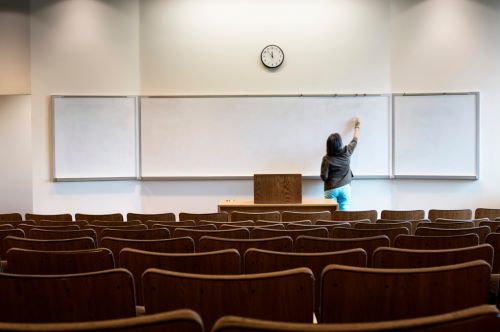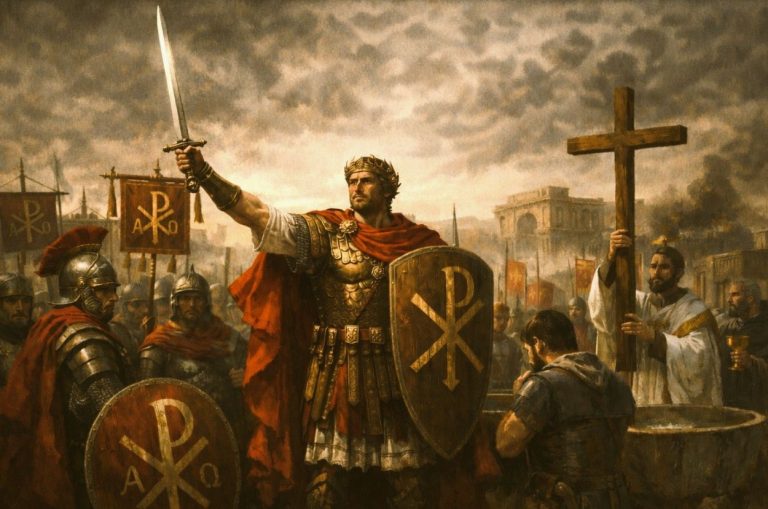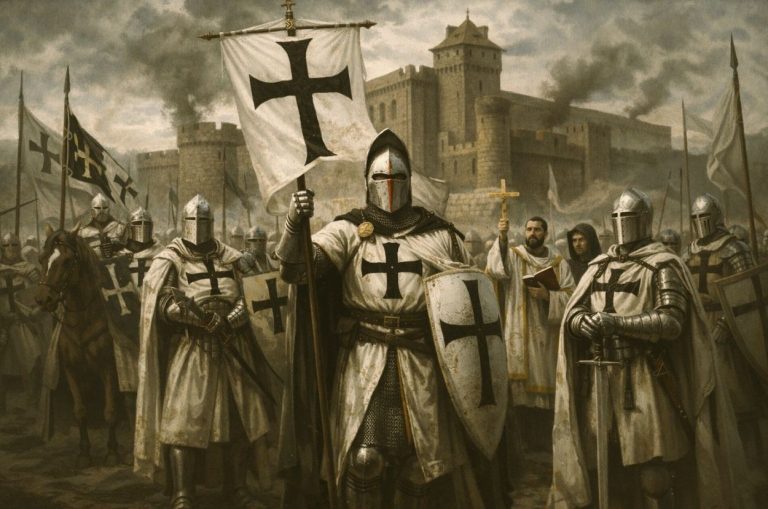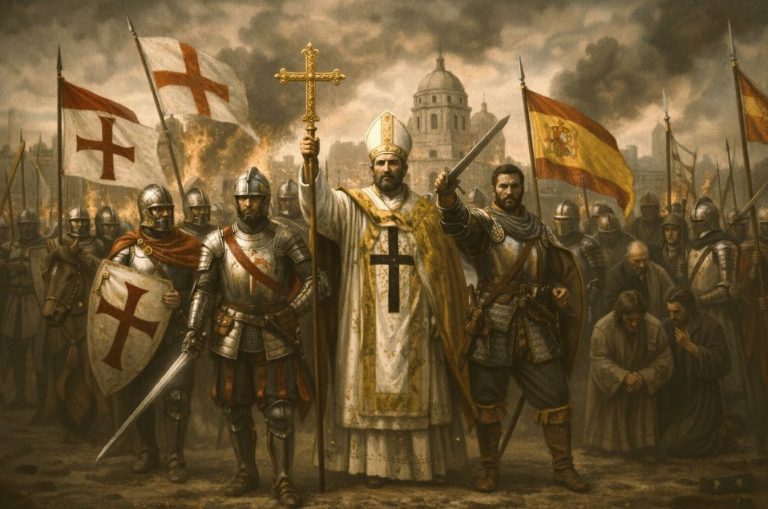

Historians, educators, students, and citizens must resist.

By Matthew A. McIntosh
Public Historian
Brewminate
Introduction
In George Orwell’s 1984, the regime declares: “Who controls the past controls the future. Who controls the present controls the past.” Orwell’s fictional warning has proved strikingly prophetic. Across the United States and increasingly throughout other parts of the Western world, a concerted effort is underway—largely led by conservative politicians, pundits, and activist groups—to rewrite or sanitize history in ways that align with their ideological goals. These campaigns range from the removal or manipulation of historical content in textbooks to the banning of books, reshaping curricula, and even criminalizing certain historical interpretations under the guise of “patriotic education.”
Here I explore the scope, motivations, methods, and consequences of this right-wing historical revisionism and the critical need to defend historical truth as a cornerstone of democratic society.
The Politics of Memory
The manipulation of history is not a new phenomenon. Regimes from Stalinist Russia to Pinochet’s Chile used historical narrative as a weapon to justify authoritarianism, silence dissent, and reinforce power structures. What’s different in the contemporary American context is the open attempt to institutionalize these revisions through legislation, education policy, and media amplification.
Conservatives argue they are simply “correcting” distortions or pushing back against what they call a “woke” or “leftist” bias in historical education. In reality, many of these efforts seek to erase uncomfortable truths—especially those related to race, slavery, colonialism, and systemic inequality—in favor of a mythologized version of the past that casts the United States as an unblemished beacon of liberty and virtue.
Targeting Critical Race Theory and Beyond

The epicenter of this movement has been the battle over Critical Race Theory (CRT)—an academic framework developed in legal studies to examine how laws and institutions perpetuate racial inequality. Although CRT is not taught in K–12 schools, it has become a catch-all term among conservatives for any educational material that addresses systemic racism or critiques the nation’s historical record on race.
Following the murder of George Floyd in 2020 and the subsequent nationwide protests, school boards, state legislatures, and right-wing media began an aggressive campaign to root out anything resembling CRT. Over two dozen states have proposed or passed laws limiting how race, slavery, and inequality can be discussed in schools. Florida’s “Stop WOKE Act,” for example, prohibits teaching that might cause students to feel “guilt” or “anguish” based on their race—a vague criterion that has led to widespread self-censorship among educators.
Books by Black authors, LGBTQ+ writers, and Indigenous scholars have been pulled from libraries or placed under review. Nikole Hannah-Jones’ 1619 Project, which reframes American history around the legacy of slavery, has been a particular lightning rod, with Republican lawmakers seeking to ban it outright from classrooms.
Reimagining the Founding Fathers
A critical target of conservative revisionism is the portrayal of the Founding Fathers. Right-wing historians and politicians often depict figures like George Washington, Thomas Jefferson, and James Madison as untouchable paragons of liberty, downplaying or outright ignoring their roles as slaveowners or their complex relationships with democracy and exclusion.
The goal isn’t just to venerate these men but to construct a national origin story free of moral ambiguity—one that can serve as a rallying cry for contemporary culture wars. Attempts to teach a more nuanced view—acknowledging both their achievements and their complicity in oppressive systems—are derided as “anti-American.”
In 2020, Trump announced the creation of the 1776 Commission, a direct response to the 1619 Project. Its report, released in January 2021, was widely condemned by professional historians for promoting a whitewashed, error-filled version of U.S. history. It painted the civil rights movement and other social justice efforts as departures from, rather than fulfillments of, the nation’s founding ideals.
The War on Public Education

In red states across the country, conservative lawmakers are using education policy to enforce ideological orthodoxy. Texas, for example, revised its social studies curriculum to minimize discussion of civil rights figures, labor movements, and Native American genocide. In South Dakota, educators are restricted from teaching concepts that suggest “that the United States is fundamentally or irredeemably racist or sexist.”
Florida Governor Ron DeSantis has taken this strategy to new heights. Under the banner of fighting “indoctrination,” he has banned Advanced Placement African American Studies, taken control of New College of Florida to turn it into a conservative institution, and pushed legislation requiring American history to emphasize “patriotism” and “the superiority of Western civilization.”
This war on public education is part of a broader agenda. By shaping what children learn—and, crucially, what they don’t—these initiatives aim to build a future electorate that is more compliant with nationalist, theocratic, or authoritarian tendencies.
Why Rewrite History?
The motivations behind these revisionist efforts are both ideological and strategic. On one level, they reflect a discomfort with demographic and cultural change. As the United States becomes more diverse and the injustices of its past become harder to ignore, conservative movements seek to reassert a narrative in which traditional hierarchies—of race, gender, and power—are not only natural but divinely ordained.
On another level, rewriting history is a political tool. Historical ignorance or distortion breeds complacency. If the story of American history is one of unbroken triumph, then calls for reparations, police reform, or economic justice appear not only unnecessary but subversive. A citizen who does not know their country’s full history cannot adequately critique it—let alone change it.
The Real Stakes
This is not merely an academic debate. When history is manipulated for political ends, it has real-world consequences. If students are denied access to the truth about America’s past, they cannot understand the roots of its present inequalities. If the stories of marginalized groups are erased, then so too is their claim to justice.
Historical revisionism erodes the very foundation of democratic society: an informed citizenry. Democracy depends on a public capable of critical thinking, of grappling with complexity, of recognizing both the nation’s promise and its failures. When public education becomes a site of propaganda rather than inquiry, the democratic project itself is endangered.
Conclusion: Resisting the Erasure
The fight over history is, at its core, a fight over memory and meaning. It is about whose stories get told, whose voices are heard, and whose version of reality is legitimized. While conservative revisionists cloak their efforts in appeals to “patriotism” and “objectivity,” their actions betray a profound fear: that an honest reckoning with the past might challenge their hold on the present.
“The most effective way to destroy people,” Orwell wrote, “is to deny and obliterate their own understanding of their history.” In the face of ongoing efforts to do just that, telling the truth is not just a scholarly responsibility—it is a civic act of resistance.
Historians, educators, students, and citizens must resist. This means defending academic freedom, supporting teachers under attack, pushing back against censorship, and telling the truth—even when it is uncomfortable. The past cannot be changed. But how we understand it will shape everything that comes next.
Originally published by Brewminate, 06.18.2025, under the terms of a Creative Commons Attribution-NonCommercial-NoDerivatives 4.0 International license.


